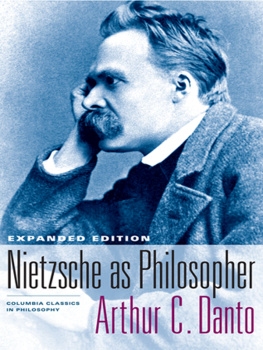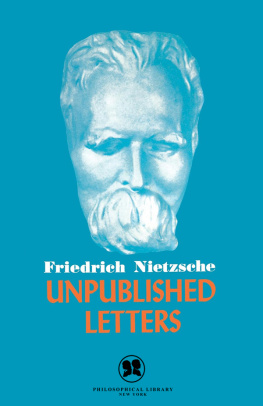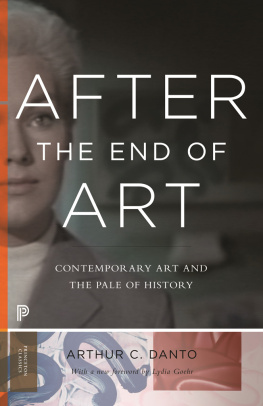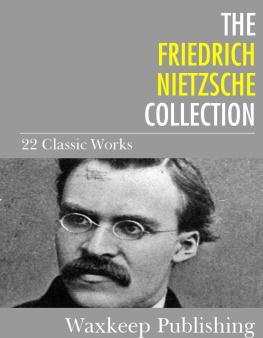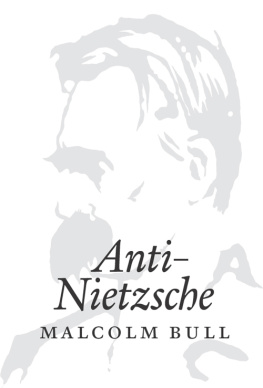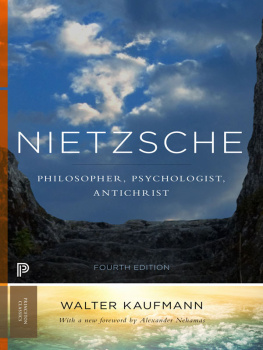Danto Arthur Coleman - Nietzsche as Philosopher
Here you can read online Danto Arthur Coleman - Nietzsche as Philosopher full text of the book (entire story) in english for free. Download pdf and epub, get meaning, cover and reviews about this ebook. year: 2005, publisher: Lightning Source Inc. (Tier 3), genre: Science. Description of the work, (preface) as well as reviews are available. Best literature library LitArk.com created for fans of good reading and offers a wide selection of genres:
Romance novel
Science fiction
Adventure
Detective
Science
History
Home and family
Prose
Art
Politics
Computer
Non-fiction
Religion
Business
Children
Humor
Choose a favorite category and find really read worthwhile books. Enjoy immersion in the world of imagination, feel the emotions of the characters or learn something new for yourself, make an fascinating discovery.
- Book:Nietzsche as Philosopher
- Author:
- Publisher:Lightning Source Inc. (Tier 3)
- Genre:
- Year:2005
- Rating:3 / 5
- Favourites:Add to favourites
- Your mark:
- 60
- 1
- 2
- 3
- 4
- 5
Nietzsche as Philosopher: summary, description and annotation
We offer to read an annotation, description, summary or preface (depends on what the author of the book "Nietzsche as Philosopher" wrote himself). If you haven't found the necessary information about the book — write in the comments, we will try to find it.
Nietzsche as Philosopher — read online for free the complete book (whole text) full work
Below is the text of the book, divided by pages. System saving the place of the last page read, allows you to conveniently read the book "Nietzsche as Philosopher" online for free, without having to search again every time where you left off. Put a bookmark, and you can go to the page where you finished reading at any time.
Font size:
Interval:
Bookmark:
Nietzsche as Philosopher |
Columbia Classics in Philosophy
Columbia Classics in Philosophy
Columbia Classics in Philosophy celebrates the longstanding tradition of influential works from Columbia University Press.
Arthur C. Danto, The Philosophical Disenfranchisement of Art, with a foreword by Jonathan Gilmore
John Rawls, Political Liberalism, Expanded Edition
Noam Chomsky, Rules and Representatives, with a foreword by Norbert Hornstein
Note on the design: The material added to this edition is set in a different typeface and with a different page design from the original pages of Nietzsche as Philosopher, thus maintaining the integrity of the first edition and distinguishing the added material.
Nietzsche as Philosopher |
Expanded Edition
Arthur C. Danto
Columbia University Press New York

Columbia University Press
Publishers Since 1893
New York Chichester, West Sussex
cup.columbia.edu
Copyright 2005 Arthur C. Danto
All rights reserved
E-ISBN 978-0-231-50938-1
Beginning to Be Nietzsche: On Human, All Too Human was originally published as an introduction to Nietzsches Human, All Too Human: A Book for Free Spirits, trans. Marion Faber (University of Nebraska Press, 1996), ixxix.
Nietzsches Daybreak: Thoughts on the Prejudices of Morality was originally published as Thoughts of a Subterranean Man, a review of R. J. Hollingdales translation of Nietzsches Morgenrote, Times Literary Supplement 4148 (1 October 1982): 1074.
Some Remarks on The Genealogy of Morals was originally published in Nietzsche, Genealogy, Morality: Essays on Nietzsches Genealogy of Morals, ed. Richard Schacht (Berkeley and Los Angeles: University of California Press, 1994), 3548.
The preface to this volume and The Tongues of Angels and Men: Nietzsche as Semantical Nihilist first appeared in German in Arthur C. Danto, Nietzsche als Philosoph (Munich: Willhelm Fink Verlag, 1998)
Library of Congress Cataloging-in-Publication Data
Danto, Arthur Coleman, 1924
Nietzsche as philosopher / Arthur C. Danto.Expanded ed.
p. cm.(Columbia classics in philosophy)
Includes bibliographical references and index.
ISBN 978-0-231-13518-4 (cloth : alk. paper)
ISBN 978-0-231-13519-1 (pbk. : alk. paper)
1. Nietzsche, Friedrich Wilhelm, 18441900. I. Title. II. Series.
B3317.D3 2004
193dc22
2004056186
A Columbia University Press E-book.
CUP would be pleased to hear about your reading experience with this e-book at .

To the memory of my parents, Samuel B. and Sylvia Danto
Contents
Nietzsche as Philosopher
Aftertexts
Nietzsche as Philosopher grew out of a long essay on Nietzsche, originally written as a contribution for A Critical History of Western Philosophy, edited by D. J. OConnor, and published in 1964. The authors were not historians of philosophy so much as philosophers who, for one reason or other, had some particular interest in a figure from the past. It was a moment when analytical philosophers had begun to think of the canonical texts of our discipline as something more than nonsense, which meant that the largely iconoclastic views of philosophy, militantly espoused by logical positivism, were at last losing their charm. I was invited to contribute to the OConnor volume by the general editor of the series in which it appeared, Paul Edwards, largely because my philosophical credentials passed muster and because I was the only one he happened to know who met that criterion and also seemed to know anything about Nietzsche. Admittedly, I did not know a lotbut I had read Nietzsche as an undergraduate at Wayne University in Detroit with Marianna Cowan, who later published a superb translation of Beyond Good and Evil. I accepted the invitation chiefly out of brashness and wrote the essay in Rome. I had moved there from the south of France, where I had completed a draft of my first major book, The Analytical Philosophy of History. As it turned out, my essay was too long, but Edwards offered me a contract for a book on Nietzsche if I would agree to shorten the article. The Analytical Philosophy of History and Nietzsche as Philosopher were published in the same year, 1965.
A recent study by the Italian scholar, Tiziana AndiniIl volto Americano di Nietzsche (The American face of Nietzsche)addresses the singular quantity of writings on Nietzsche that American philosophers produced in the second half of the twentieth century; she speculates that Nietzsche answered to something deep in the American grain. What I can claim credit for, I think, is that my book opened Nietzsche up for young analytical philosophers, for my effort had been to show that Nietzsche had written boldly and imaginatively on the very questions that defined analytical philosophy as a movementquestions in the philosophy of science, of language, and of logicand that he was not some marginal kook who stood for something alternative to philosophy as we understood it. My book showed that it was possible to write on Nietzsche without losing ones philosophical credibility. One could in at least this one case have ones cake and X eat it too. And this secured an intellectual annuity for the book, which has remained part of the growing literature it helped validate at the beginning and to which I contributed from time to time with essays on this or that aspect of Nietzsches thought.
When my wonderful German publisher, Axel Kortendeickalas now deadraised the question of a German translation of Nietzsche as Philosopher, I proposed that it appear together with these supplementary writings. The result was that readers of Nietzsche als Philosoph (Wilhelm Fink Verlag, 1998) had access to a broader picture of my thought on Nietzsche than was easily available in English. I cannot say how grateful I am to Wendy Lochner, the philosophy editor at Columbia University Press, for welcoming the suggestion of bringing out a new edition that would incorporate this added material. There is no way in which I could rewrite a text that reflects that moment, nearly forty years ago, in the history of contemporary philosophy. But the book continues to be read and taught in the growing number of courses and seminars devoted to Nietzsche, and since it is part of the history it has helped shape, and since I still stand by its interpretation of its subject, nothing much could be gained by tweaking it to deal with the criticisms it has naturally generated: no response is a response in its own right. The added materials, meanwhile, enrich the reading of Nietzsches writing from the perspective the book first opened.
I would like to acknowledge here some of the philosophers who have not only contributed to the history Dr. Andini traces but have in one way or another engaged my subsequent reflections on Nietzsche. These include Maudemarie Clark, Kathleen Higgins, Robert Solomon, Alexander Nahamas, Bernd Magnus, and Richard Schacht. The short note on Nietzsches Artistic Metaphysics was delivered as a response to an excellent presentation by Birgit Recky, of Hamburg Universitt, at a session, organized by Paul Guyer on Ethics and Aesthetics, at the 2003 meeting of the American Society for Aesthetics.
A few years before the killings at Columbine, a group of youths in Pearl River, Mississippi, embarked on a rampage of murder and brutality, inspired, according to their leader, by the philosophy of Friedrich Nietzsche. The aggressors did not describe themselves as Supermen but as thinkers, set apart from the herd who did not understand themparents, teachers, and insufficiently responsive girls, to whom they felt themselves entitled to teach a hard lesson. As I followed the accounts in the
Font size:
Interval:
Bookmark:
Similar books «Nietzsche as Philosopher»
Look at similar books to Nietzsche as Philosopher. We have selected literature similar in name and meaning in the hope of providing readers with more options to find new, interesting, not yet read works.
Discussion, reviews of the book Nietzsche as Philosopher and just readers' own opinions. Leave your comments, write what you think about the work, its meaning or the main characters. Specify what exactly you liked and what you didn't like, and why you think so.

